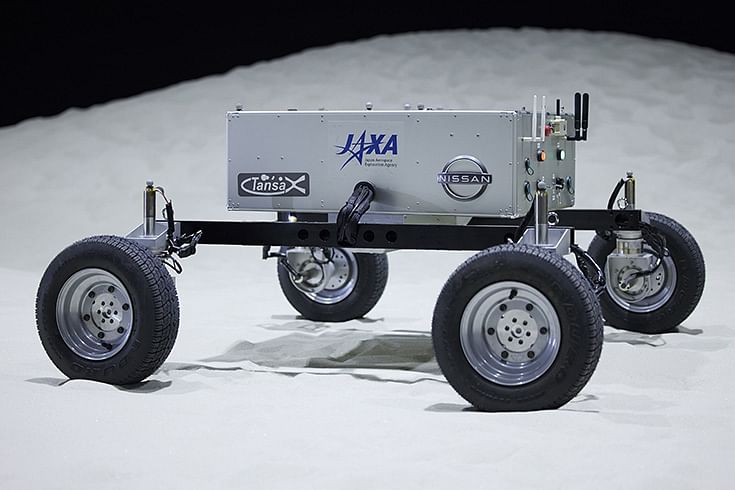Nissan unveils AWD lunar rover prototype
Jointly developed with Japan Aerospace Exploration Agency, Nissan’s all-wheel EV precision control technology boosts the rover’s surface driving performance
Nissan Motor Co today unveiled a lunar rover prototype jointly developed with the Japan Aerospace Exploration Agency (JAXA) at its Nissan Futures event in Japan.
The JAXA Space Exploration Innovation Hub Center is conducting research on lunar rovers — a key technology for space exploration. Nissan has been working with JAXA on driving controllability of the rovers since January 2020.
A lunar rover must be able to traverse the moon’s powdery, rocky and undulating terrain and be energy efficient. Furthermore, energy sources for operating vehicles in space are limited.
Nissan’s research applies the motor control technology it has developed through its production of mass-market electric vehicles such as the LEAF as well as the e-4ORCE all-wheel control technology featured on the all-new Ariya electric crossover. In particular, it is e-4ORCE that is boosting the lunar rover’s performance over tricky terrain.

EV all-wheel control technology
Nissan has focused on the development of stable driving performance that enables customers to drive their cars with greater confidence. Nissan’s e-4ORCE technology precisely controls all four wheels independently, providing the driver with confidence in various conditions.
In its joint research with JAXA, Nissan is evolving e-4ORCE technology to improve its performance in sandy terrain and other harsh conditions. When cars are driven in sand their wheels frequently spin and dig in, impeding progress. A high level of driving skill is required to avoid getting stuck. To meet this need, Nissan has developed driving-force controls that minimize the amount of wheel spin in accordance with surface conditions.
Through the joint research, Nissan aims to contribute to the technological evolution of automotive technology and space exploration technology by sharing knowhow gained from test-vehicle development and combining it with JAXA's knowledge of rover research.
Describing the research, JAXA Director of the Space Exploration Innovation Hub Center, Ikkoh Funaki said: “JAXA aims to apply the research results to future space exploration. We are collaborating with companies, universities and research institutes on projects that are feasible and have potential for commercialization and innovation. By conducting research with Nissan, which has expertise in electrified technologies, we hope to apply our findings to the development of higher-performance lunar rovers.”
Toshiyuki Nakajima, general manager of the Advanced Vehicle Engineering Department in charge of e-4ORCE control development at Nissan, added: “The uses of automobiles and driving situations are wide-ranging. We aim for the ultimate driving performance through our research and development, and believe the knowhow gained from this joint research with JAXA will lead to innovations in our vehicles that will bring benefits to customers.”
RELATED ARTICLES
Hyundai unveils next−gen highly efficient hybrid system
The next-gen hybrid system is claimed to offer 45% better fuel efficiency and 19% more power compared with ICE powertrai...
Horse Powertrain reveals hybrid conversion for electric cars
Engine-making joint venture of Geely and the Renault Group announces new hybrid powertrain that fits into the same space...
Aisin to produce hybrid motor for Mitsubishi in Thailand
The hybrid drive motor and gearbox, will be produced at Aisin Powertrain (Thailand) Co for use in the Mitsubishi XForce ...






 By Autocar Professional Bureau
By Autocar Professional Bureau
 02 Dec 2021
02 Dec 2021
 3440 Views
3440 Views




















